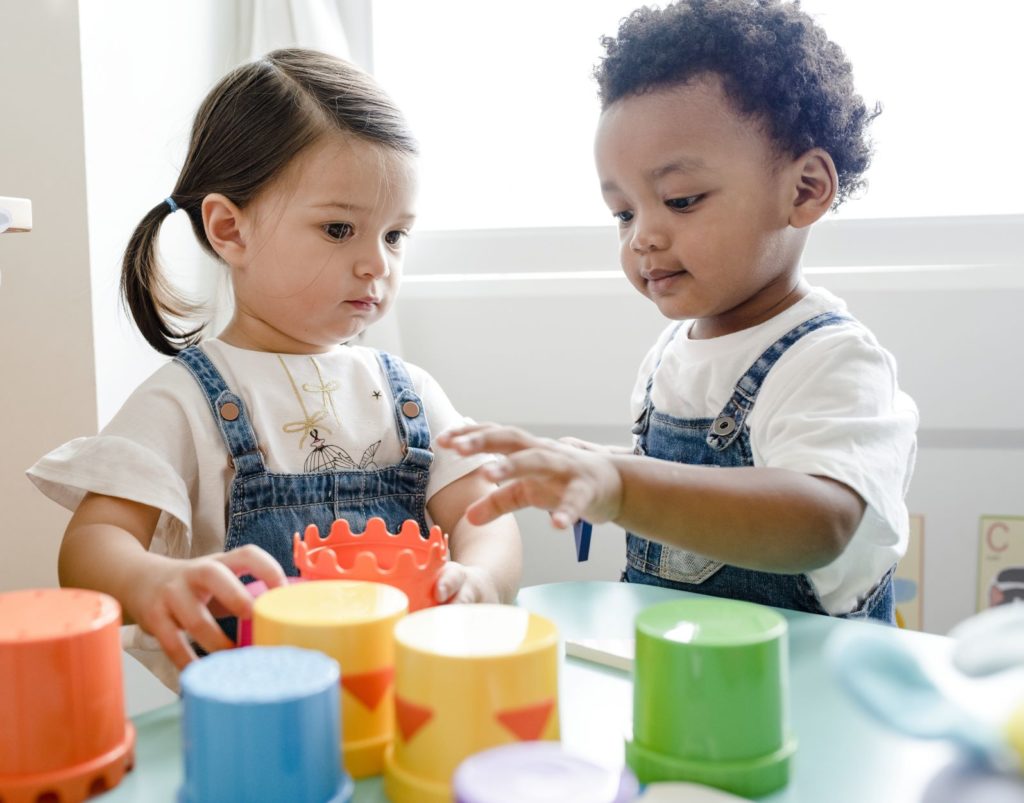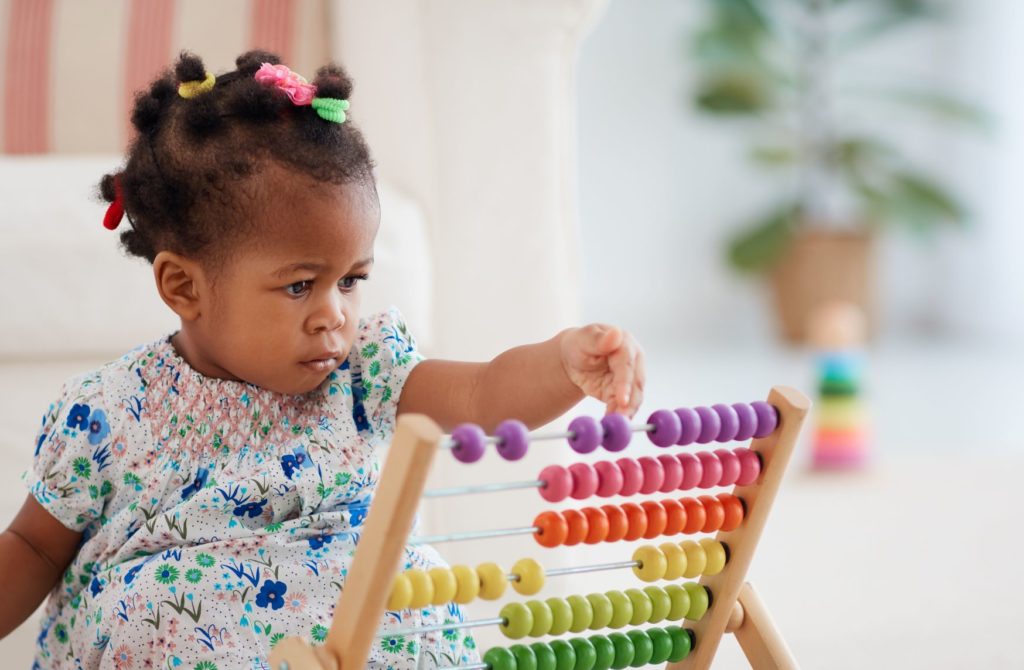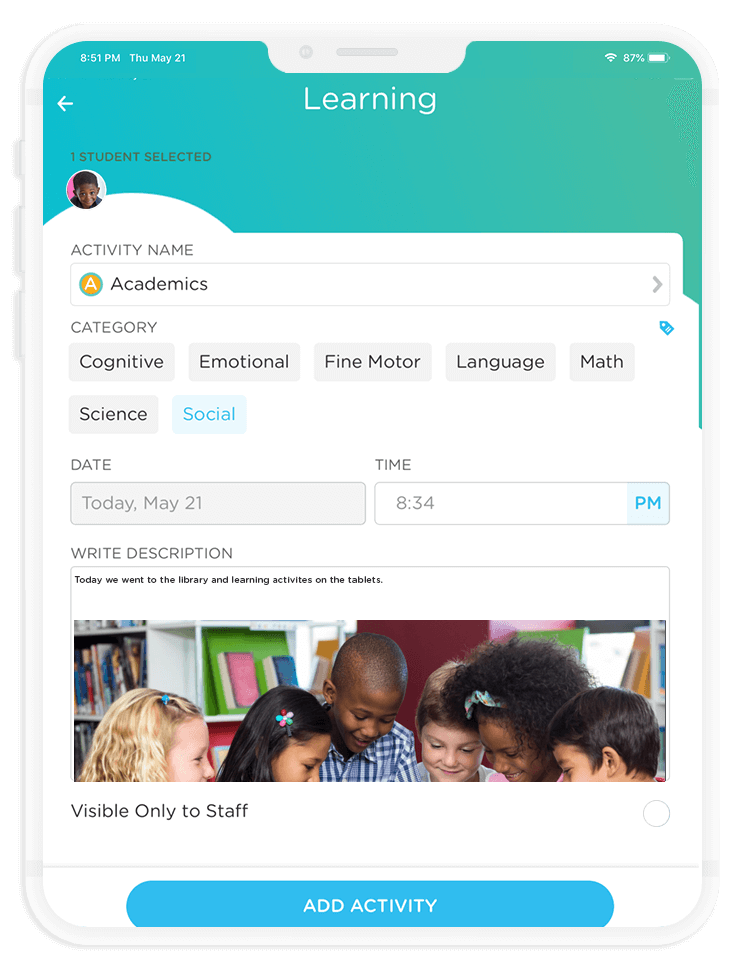
Child care activities are more than just a way to keep kids occupied and out of trouble. They provide the structure and context for kids to develop new skills and competencies as they grow up within your child care center. By choosing age-appropriate and fun child care activities, providers give kids the opportunity to challenge themselves, build confidence and succeed as learners in the first five years of life.
In this blog post, we’re focusing on educational child care activities that providers can deliver to help accelerate early learning in their kids. We’ll talk about how the early learning process works, how child care activities connect to the four developmental domains of early learning and highlight some of our favorite child care activities that help kids reach their full potential.
Let’s get started!
Child Care Activities & The Four Developmental Domains
If you’re passionate about making a positive impact in a child’s early learning journey, it’s important to begin with an understanding of how the learning process works across all four developmental domains. There have been decades of research and entire books devoted to this topic, but here’s a quick summary of basics that you should know.
Kids Learn By Playing
Adults have many ways to learn something new – we can listen to a lecture, read a book, do a hands-on project, observe others … and the list goes on. For kids between birth and age five, the most important method of learning is play.
We might define play as those activities which kids (and adults) engage in for fun, but which also provide developmental rewards. Play gives kids the opportunity to harness their creativity while practicing valuable linguistic, social and cognitive skills. The majority of our child care activities are games that fall firmly within the domain of play.
Child Care Activities Span the Four Developmental Domains
A healthy diet of food includes all four major food groups: fruits and vegetables, protein products, dairy products and grain products.
Similarly, a healthy diet of child care activities includes tasks and games that span the four developmental domains: cognitive, linguistic, social/emotional and physical. To achieve well-rounded development, kids should be encouraged to participate in activities that cover all four domains.
The First Five Years are the Most Important
When it comes to early childhood education, the first five years of learning are the most important formative period of a child’s life. The skills and attitudes they develop during these first five years will play a significant role in shaping their personalities and defining their trajectory in the future.
Kids also seem to learn fastest during the first five years, readily acquiring a new language or even mastering complex skills with enough focus. Kids at this age need love and nurturance from caregivers to develop the confidence and self-esteem that will help them maximize their potential later in life.
Early Education Makes an Impact
Receiving a good early education makes a significant impact in a child’s life. Kids who have access to high-quality early learning tend to reach higher levels of educational attainment, cognitive achievement and have better adult life outcomes. They’re also less likely to experience behavioral or emotional issues, or to be involved in crime during the teen years.
The evidence is crystal clear that early learning with effective child care activities gives kids the foundation to succeed in life. Let’s now take a closer look at some child care activities that can make a positive impact.
Educational Child Care Activities to Support Early Learning

Our list of educational child activities is divided into four parts – one for each of the four developmental domains.
However, it’s important to note that many, if not most, child care activities actually support development in more than one domain.
A great example of this is beach ball volleyball. It’s a physical game with gross motor benefits, but kids are also learning to take turns and work as a team – two elements of social/emotional development.
Another common example appears when kids play role-playing games that involve a supermarket or convenience store. This activity can have an impact across all four developmental domains:
- Social/emotional – Kids learn to empathize and see life from different perspectives by taking on a role in the context of the game.
- Linguistic – Kids model interactions between adults through role-play. In this case, kids can develop their language and communication skills by modeling interaction between customers and the shopkeeper.
- Cognitive – Shopkeepers can set the price for items, negotiate or haggle the price with the customers and practice counting out the change for the purchase (using play money, of course).
- Physical – The physical act of counting change and exchanging money promotes the development of fine motor skills.
As you read through our list, ask yourself which of these child care activities might cover more than one domain – or which ones cover all four!
Child Care Activities for Early Social/Emotional Development
- Feelings Check-In – An emotional check-in encourages kids to develop self-awareness by considering and reporting on their own emotions during the day. Kids should be given a short time to think before sharing their answers with a caregiver, on paper or with the group. Caregivers can give kids the choice to either explain their feelings in more detail, or keep them private.
- Mirror Faces – In this activity, kids have fun making faces at a mirror and learning to express and recognize a variety of emotions in themselves and their peers.
- Parade/Follow the Leader – Parade games are fun and social. Kids learn there’s a time to lead and a time to follow, and everyone can take turns at the front of the line.
- Engage in Dramatic Play – Dramatic play includes all kinds of improvised, unstructured and contextual role-playing games. Kids can act out scenes from the doctor’s office, the home or the grocery store. Acting out a phone call and playing with puppets are also forms of dramatic play.
- Draw and Act Out Emotions – Kids can learn to recognize emotions by drawing different facial expressions, or acting out emotions in a dramatic setting. For added fun, caregivers can set up a game of charades in which the actor must stay silent while others guess which emotion they’re expressing.
- Play Turn-Taking Games – Turn-taking is a social skill we use every day. We wait our turn to speak in a conversation, drive through an intersection or pay for our groceries at the store. Kids develop this skill through turn-taking activities like playing with cards or sharing favorite toys.
- Teach Self-Calming and Relaxation Skills – Kids can learn self-calming and relaxation skills to help them deal with big emotions like stress, anxiety or frustration. These basic skills can include things like counting to 10, taking deep breaths or even a simple mindfulness practice.
Child Care Activities for Early Physical/Motor Development
Physical development includes gross motor development (arms and legs) and fine motor development (hands and fingers). To cover our bases, we’ve included our favorite child care activities for both fine and gross motor development.
Gross Motor Activities
- Animal Walk – Have kids pretend to be their favorite animal and walk like a gorilla, a crocodile or a tiger.
- Puddle Jumping – Get out the Wellington boots and encourage kids to have fun and get wet by splashing in puddles on a rainy day.
- Obstacle Course – Set up a safe and exhilarating obstacle course where kids can run, jump, hop and skip their way to the finish line.
- Limbo – How low can you go? Limbo is an exciting party game that helps kids develop their flexibility and sense of balance.
- Hide & Seek – Best played outdoors – but make sure to maintain adequate supervision of hiding spots! One kid closes his or her eyes and counts to 20, everyone else runs and hides! The last person to be found wins – and gets to be the seeker in the next game.
- Tag! – A childhood favorite where everyone knows the rules – remind kids to tag gently, play fair and have fun.
- Nature Walk – Kids spend a fair time on flat surfaces like floors, fields and the sidewalk. A nature walk gives them the opportunity to feel how their bodies work going uphill, downhill, in the dirt and mud, or on a gravel path – plus they can learn about the plants and animals in your area.
- Bean Bag Toss – Set up a couple of targets and encourage kids to practice their aim with a bean bag toss. For even more fun, create a point-scoring system and play either competitively or cooperatively.
- Beach Ball Volleyball – Beach ball volleyball is a modified sporting game that’s kid-friendly and great exercise.
Fine Motor Activities
- Finger Painting – Use child-safe paints and encourage kids to create a work of art with their fingers, hands and a blank page or canvas.
- Drawing – When kids are old enough to hold writing utensils, they can draw with pencils, charcoal or pastels as a fun art exercise to promote fine motor development.
- Arts & Crafts – Crafting projects can involve a variety of materials that promote fine motor development – markers, stamps, paper, string, safety scissors, glue and lots more. Holiday-themed crafts are a perennial favorite and make a great gift from kids to parents.
- Play-Doh – Kids develop their fine motor skills as they mold and sculpt Play-Do into food, cars or simple 3D shapes.
- Stacking and Building Games – Stacking cans, blocks, cups or building a card castle is a fun way for kids to develop fine motor capacity – who can build the biggest tower?
Child Care Activities for Early Linguistic Development
- Singing Songs – Songs have a way of sticking in a child’s memory and promoting language development. Caregivers should sing songs to kids and encourage them to sing along when they’re old enough to learn and remember the words.
- Reading & Storytelling – Reading is a fundamental part of early linguistic development. Caregivers should read books to kids, encourage kids to read on their own and engage in creative and imaginative storytelling in collaboration with kids.
- Alphabet & Writing – Kids develop language and fine motor skills by learning to write. Caregivers can start by teaching the alphabet, then move on to short words. As vocabulary increases, kids can start writing in complete sentences.
- Jokes & Riddles – Jokes and riddles are great for both linguistic and cognitive development. They help kids learn to listen and think outside the box – and they’re often great for a laugh.
- Tongue Twisters – She sells seashells by the seashore, Fuzzy Wuzzy was a bear and Peter Piper picked a peck of pickled peppers. Tongue twisters help kids learn to listen, enunciate words and develop a love of language.
- Word Games – Age-appropriate word games can help kids expand their vocabulary and build verbal reasoning skills. Kids can play word search puzzles, “I Spy,” think of “opposites” of words they know, experiment with rhyming words, hunt for words posted in the classroom, guess the animal/toy/place or have fun with mad-libs.
- Listening Activities – Listening is an important part of language acquisition. Games like “Simon Says!” or “Follow the Leader” give kids the chance to practice their listening skills in an interactive and engaging setting.
Child Care Activities for Early Cognitive Development
- Puzzles – Kids can play with jigsaw puzzles, maze puzzles, connect the dots and more. Child education apps connect kids with age-appropriate puzzle games that challenge their cognitive abilities and accelerate early development.
- Pattern Finding & Matching Games – Caregivers can create a pattern and ask kids to figure out what comes next, or set up a memory-based matching challenge using flashcards or a standard 52-card deck.
- Sorting & Sequencing Games – Learning to group similar objects or place things in the right order is a core cognitive skill. Kids can sort objects by color, shape, size or any other obvious feature. They can sequence by number, by increasing size or even by favorites! Beads, buttons and flashcards are all great for sorting.
- Counting – Learning to count is a fundamental skill that provides the basis for building math skills later in life. Kids learn to count by rolling dice, playing hopscotch, doing turn-based counting games like Bizz-Buzz,21 and 7-Up or making a craft that involves counting.
- Playing Board Games – Board games can teach a range of cognitive, social/emotional and linguistic skills. Kids learn to take turns, count, keep track of information and communicate with other players to keep the game moving.
Plan Child Care Activities and Track Developmental Milestones with Procare Solutions

Educational child care activities give kids the chance to build their skills and fulfill their potential in life – and Procare is here to help, with solutions that make it easy to track each child’s progress across all four developmental domains.
Procare provides trustworthy and modern child care software that gives you the ability to plan child care activities in alignment with state early learning standards, track developmental milestones, and share special moments of progress with moms and dads through our parent engagement app.
From the moment kids rush in the door, until closing time, Procare will be your all-in-one solution for successfully managing your center and helping each child learn and grow.
Ready to learn more?




